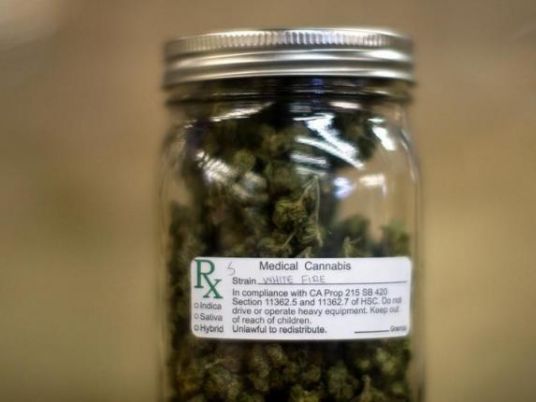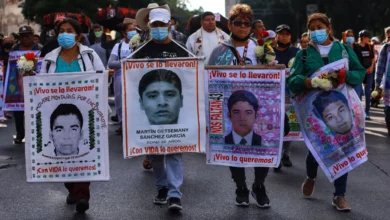
When her legs ache, this Mexican grandmother rubs them with marijuana-infused alcohol. She is well aware the homemade remedy defies the country's cannabis ban, but her family has used the concoction to treat ailments since she was a child, handing it down the generations.
"I really have a lot of faith in it," said the slender 53-year-old, a housewife and amateur dancer who spoke to AFP about her cannabis use on condition of strict anonymity.
"When I'm very tired, I spread it on my legs, feet and body. It's really good. I can go without salt but not without marijuana with alcohol. My grandmother used it," she said, holding a plastic bottle filled with the leaves and liquid.
In turn, she used the family remedy to care for her three children, and three grandchildren. For the kids, a piece of cotton soaked in the liquid is placed in the bellybutton to fight fevers. When they're congested, the alcohol is rubbed on the chest and back.
A debate on whether to legalize marijuana for recreational or medicinal uses in Mexico is in its infant stages, but Mexicans have used cannabis for therapeutic purposes for centuries.
The national discussion was launched in November when the Supreme Court issued a landmark ruling authorizing four people to grow and smoke marijuana for personal use, opening the door for others to seek similar permits.
Weeks earlier, the parents of an eight-year-old girl named Grace, who suffers from a severe form of epilepsy, won a legal battle to import a cannabis-based oil to treat her condition.
But for generations Mexicans have been using "grandma's magic remedy" to combat a wide range of pains, fevers or other complaints.
The cannabis-infused oil can be kept for months, and many keep a flask hidden in a closet. The remedy also comes in dry forms or as pastes. Some drink marijuana tea to relieve headaches or help with insomnia while others smoke it to fight nausea or cancer-related pains.
"Infused into alcohol is the traditional use for rheumatism as well as muscular and circulation pains," said Humberto Rocca, a doctor specializing in addictions and herbalism.
"It's an ancient medicine, passed on from generation to generation. Young people know that their grandmothers or mothers use it," Rocca said.
Home brew
Jorge Hernandez Tinajero, a veteran pot legalization activist, said Spanish conquistadors brought hemp with them, and indigenous populations added it to their ceremonial and medicinal traditions.
"Marijuana began to be used in different ways in the 16th century, for rituals guided by shamans, which persist to this day in some villages," said Tinajero, who is part of the Mexican Association of Cannabis Studies.
In a Mexico City home, a 33-year-old publicist agreed to show AFP reporters his hydroponic system of some 20 marijuana plants growing under intense spotlights.
"This is for personal and medical use," he said from his greenhouse, walking barefoot and smoking a joint during the chat.
"There's no sale or purchases. We only do this to change the system and this war" against drug trafficking, he said, echoing the argument among pro-legalization activists that decriminalizing pot will help combat the violence associated with the illegal trade.
He taught himself to make various types of therapeutic marijuana, including the traditional alcohol-based recipe, a thick wax concentrate of tetrahydrocannabinol — the main psychoactive ingredient in cannabis — which is used to treat nausea, and extracts that are used for vaporizations.
"If your mom has a migraine, you give her a little tea because the pain goes away with a little bit of marijuana," he said.
"Typically I make alcohol for the grandmother of a friend who has pains in the hands or feet due to arthritis or sciatica," said the man, who insists he gives away the medicine for free.
National debate
While President Enrique Pena Nieto has voiced opposition to legalizing marijuana, he has convened experts to hold debates between January and March to see if the government should change the law in the wake of the Supreme Court ruling.
In its wake, Mexican health authorities this week issued the first permit allowing the individuals concerned to grow their own marijuana for recreational purposes.
Though limited to those four people only, the authorization opens a crack in Mexico's prohibitionist policies.
In parallel, a member of Pena Nieto's Institutional Revolutionary Party has introduced a bill in the Senate that would allow Mexicans to import and consume medical marijuana — though not grow it on national soil.
But the head of the government's Cofepris health and drug regulator, Mikel Arriola, doubts the medicinal value of marijuana.
"For it to have healing effects, it must be presented in a medicine form, like a tablet, an injection or a solution," Arriola told AFP. "Marijuana does not go through this process. Its healing effects are not recognized."
A spokesman for the attorney general's office said that carrying marijuana-infused alcohol is illegal. But he also said there was no precedent of anyone being arrested for using the home brew.




